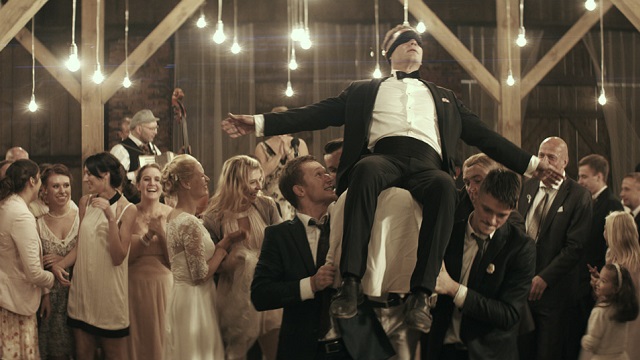Every person, every family, every culture, every society, and every country has skeletons in their closet. Denying the existence of those skeletons, perhaps by burying them deep into the subconscious and refusing to acknowledge their existence, just causes them to fester until they poison everything they’ve ever touched. The collective ignorance of a once-corrupted society further erodes the foundation on which that society was built. And, sometimes, that can spoil the party.
The wedding in Demon celebrates the marriage of Peter (Itay Tiran) and Zaneta (Agnieszka Zulewska) who met while attending a British university. Zaneta is a Polish girl who had been studying abroad and is bringing Peter back with her to start anew. Her family makes their living developing land, tearing down old structures and rebuilding over them. As a wedding present, her father gifts the couple with a family farm over which they are to make their dream house. Using an excavator to mark the placement of their pool, Peter finds a dead body buried in a wedding dress whose spirit possesses him throughout the wedding.
Weddings are meant to be a joyous occasion, celebrating the formation of a couple and helping them create their new family and future together. Peter and Zaneta’s is no exception. Zaneta’s father does his best to keep the vodka flowing, the band playing, the food plentiful, and the guests happy even as the groom seems to be suffering a breakdown of sorts. Peter freaks out on several occasions and is repeatedly escorted away from the party for his erratic destructive behavior. Neither the doctor nor the priest can figure out what is going on; or, at least they refuse to acknowledge it. The only person speaking sense is the drunk Jewish history teacher who gives depressing messages about the town’s history and that he once knew and loved a young girl who was taken away by Nazis.
Demon is less about demons and possessions than a collective willful amnesia that afflicts countries with traumatic histories. Germany forced itself to look at its own abusive past by turning concentration camps into open historical parks, and erecting monuments to the Holocaust in multiple places around Berlin. Poland, by contrast, acknowledges what happened but seems to deny its own participation in the occurences. Their collective response seems to be “It was those guys, the Germans, who took our Jewish neighbors away; we saw or did nothing wrong.” Every time somebody brings up the subject, they usher the rabble rouser out of the room and give everybody vodka to hide the situation at hand.
As Marcin Wrona’s third and final film, Demon is a masterful exercise in atmospheric dread and political allegory. He drenches the film in a washed out color palette with spikes of black humor that punctuate just how oppressive the situation feels. Wrona’s formalism shines through every step of the way, creating delectable (if a little heavy handed) imagery to further suppress any joy or cheap thrills contained within the story.
Demon is further haunted by the postscript of Marcin Wrona’s suicide. Days after it premiered at TIFF, days before it was to premiere in Israel, and as it was showing at a film festival in Gdynia, Poland, Marcin Wrona hung himself in his hotel room. He was 42.

